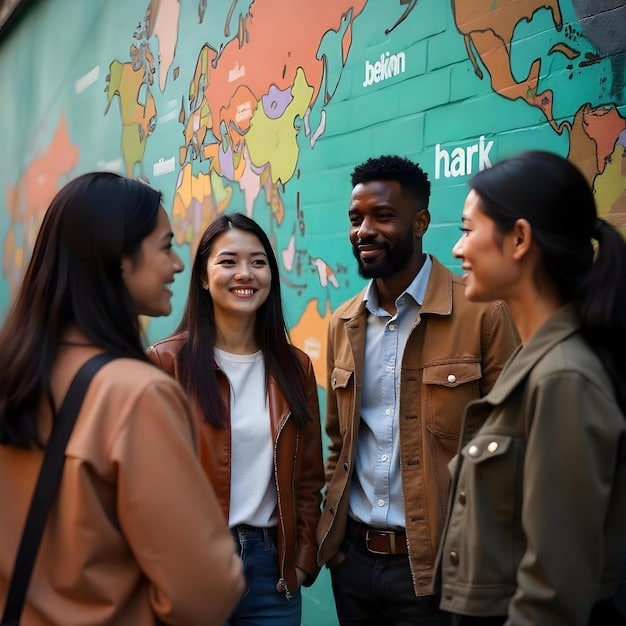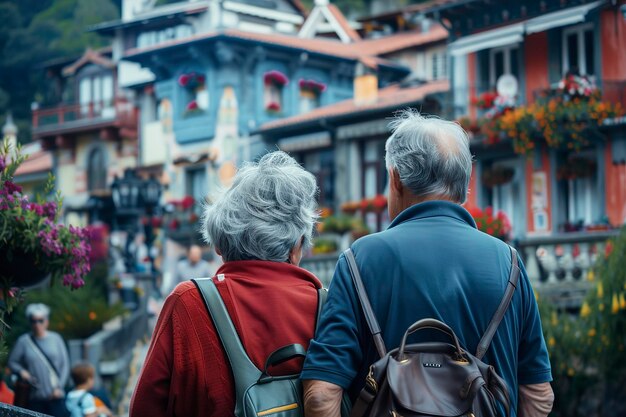Cultural Sensitivity Training: Your Guide to Meaningful Travel

Cultural Sensitivity Training for International Travelers: Avoid Costly Mistakes and Build Meaningful Connections by learning about different cultures, respecting local customs, and fostering positive interactions. This training helps travelers navigate diverse environments respectfully and effectively during international travels.
Embarking on international travels opens a world of exciting experiences. But have you considered how your actions resonate with the local culture? Cultural Sensitivity Training for International Travelers: Avoid Costly Mistakes and Build Meaningful Connections begins with understanding that every culture has its own unique nuances and expectations. This training equips you with the knowledge and skills to navigate these nuances gracefully.
Imagine building bridges instead of inadvertently creating barriers. A little cultural awareness can transform your trip from a mere sightseeing tour into a deeply enriching experience. Let’s explore how cultural sensitivity training can become your invaluable travel companion.
Why Cultural Sensitivity Training Matters for Travelers
Traveling internationally is more than just seeing new places. It’s about engaging with different cultures and respecting their traditions. Cultural Sensitivity Training for International Travelers: Avoid Costly Mistakes and Build Meaningful Connections broadens your perspective and helps prevent misunderstandings. It prepares you to interact respectfully and thoughtfully with people from different backgrounds.
Cultural sensitivity isn’t just a nice-to-have; it’s essential for creating positive travel experiences. By being mindful of cultural differences, you contribute to more meaningful interactions and avoid unintentionally causing offense.
Avoiding Cultural Missteps
One of the primary benefits of cultural sensitivity training is learning to avoid common cultural missteps. These mistakes can range from minor faux pas to serious offenses, depending on the culture. Education in cultural norms helps reduce these errors.
Building Genuine Connections
Understanding cultural nuances allows you to build genuine connections with locals. People appreciate it when you make an effort to learn about their culture. These connections can lead to richer, more rewarding travel experiences and lasting friendships.
- Learn basic phrases in the local language to show respect.
- Research local customs and traditions before you go.
- Be aware of non-verbal communication differences.
Cultural sensitivity enriches your travel experiences. It helps you avoid mistakes, build genuine connections, and understand the world better. By embracing cultural awareness, you become a more respectful and mindful traveler.

Key Components of Cultural Sensitivity Training
Cultural Sensitivity Training for International Travelers: Avoid Costly Mistakes and Build Meaningful Connections involves several key components. These components help individuals develop a comprehensive understanding of cultural differences and how to navigate them effectively while traveling.
Effective training programs typically cover a range of topics, from understanding verbal and non-verbal communication differences to learning about local customs and etiquette.
Understanding Verbal Communication
Verbal communication differs significantly across cultures. Directness, tone, and the use of honorifics vary. Cultural sensitivity training can help you understand these differences and adapt your communication style accordingly.
Non-Verbal Communication Awareness
Non-verbal cues like body language, gestures, and eye contact have different meanings in different cultures. Being aware of these differences is crucial for avoiding misunderstandings. Training often includes exercises to help you recognize these cues.
- Learn about accepted distances for personal space.
- Understand the meaning of different gestures in various cultures.
- Be aware of the cultural significance of eye contact.
Mastering these components enhances a traveler’s ability to interact respectfully and effectively with people from different backgrounds. This leads to more positive and meaningful travel experiences. Cultural sensitivity training is invaluable for any international traveler.
Benefits of Culturally Sensitive Travel
Choosing to travel with cultural sensitivity brings countless benefits. Not only do you enhance your own experience, but you also contribute to positive relationships with the communities you visit. Cultural Sensitivity Training for International Travelers: Avoid Costly Mistakes and Build Meaningful Connections leads to more enriching interactions.
Culturally sensitive travel helps in fostering respect for local traditions and customs. It promotes meaningful exchanges that benefit both the traveler and the host community.
Respect for Local Traditions
Showing respect for local traditions is a cornerstone of culturally sensitive travel. This involves learning about and adhering to local customs, even if they differ from your own. Doing so demonstrates your appreciation for the local culture.
Enhanced Intercultural Communication
Cultural sensitivity training enhances your ability to communicate effectively across cultures. You learn to avoid misunderstandings and communicate in a way that is respectful and considerate. This ultimately improves your interactions and relationships with locals.
- Being open to learning from locals.
- Engaging in cultural exchange.
- Supporting local businesses.
Embracing cultural sensitivity enriches your own travel experiences and strengthens intercultural relationships. Travelers who prioritize cultural sensitivity contribute to a more interconnected and respectful world. It is a rewarding approach to international travel.

Practical Tips for Developing Cultural Sensitivity
Developing cultural sensitivity is an ongoing process that involves self-awareness, education, and practice. Cultural Sensitivity Training for International Travelers: Avoid Costly Mistakes and Build Meaningful Connections offers practical tools. These include learning about different cultures and reflecting on your own biases.
Adopting a mindful approach to travel can greatly enhance your cultural sensitivity. This includes being open to new experiences and willing to adapt your behavior as needed.
Educate Yourself
Before you travel, take the time to educate yourself about the culture of your destination. Read books, watch documentaries, and research online. The more you know, the better prepared you will be. This preparation is a key aspect of cultural sensitivity training.
Practice Active Listening
When interacting with locals, practice active listening. Pay attention not only to what they say but also to their body language and tone. This can help you understand their perspective and avoid misunderstandings. Openness is really important for Cultural Sensitivity Training for International Travelers: Avoid Costly Mistakes and Build Meaningful Connections
- Reflect on your cultural background.
- Be open to challenging your assumptions.
- Seek out opportunities to interact with people from different cultures.
By integrating these practices into your travel routine, you can continually enhance your cultural sensitivity. Each trip becomes an opportunity to learn and grow. Cultural sensitivity broadens your world view and fosters more meaningful connections.
Resources for Cultural Sensitivity Training
A variety of resources are available to help travelers develop cultural sensitivity. Cultural Sensitivity Training for International Travelers: Avoid Costly Mistakes and Build Meaningful Connections is becoming more accessible. There are online courses and workshops to personalized coaching sessions.
Leveraging these resources enhances your knowledge. It provides you with the tools and skills needed to confidently navigate diverse cultural environments.
Online Courses and Webinars
Many online courses and webinars offer comprehensive training in cultural sensitivity. These resources often cover a range of topics, from communication styles to cultural etiquette. They provide flexibility and convenience for busy travelers.
Workshops and Seminars
Workshops and seminars led by cultural experts offer in-depth, hands-on training. These sessions often include interactive exercises and role-playing scenarios. This enables the traveller to be prepared for Cultural Sensitivity Training for International Travelers: Avoid Costly Mistakes and Build Meaningful Connections.
- Community Centers and Cultural Organizations often offer courses.
- Books and Blogs can be used to aid familiarization.
- Language Learning Apps, can also improve understanding and communication.
Accessing these resources ensures you’re well-prepared for your international travels. They enrich your experiences. The resources also support responsible engagement with local communities. Cultural sensitivity training is within everyone’s reach.
| Key Point | Brief Description |
|---|---|
| 🌍 Cultural Awareness | Understand cultural norms to avoid misunderstandings. |
| 🤝 Respect Traditions | Show appreciation for local customs and practices. |
| 🗣️ Effective Communication | Communicate respectfully and adapt to different styles. |
| 📚 Continuous Learning | Stay informed through ongoing education and reflection. |
Frequently Asked Questions
It involves learning about different cultures, respecting customs, and building positive interactions. The intention of cultural sensitivity training is to helps travelers navigate diverse environments respectfully and effectively.
Cultural sensitivity enhances understanding, avoids misunderstandings, and promotes respectful interactions with locals, making travel experiences richer and more meaningful for both traveler and host.
There are various online courses, workshops, books, and cultural centers. These resources help travelers learn about different cultures and develop necessary cultural skills for their trip.
Start by researching your destination, practicing active listening, and reflecting on your cultural biases. Engage with people from different backgrounds and be open to learning and adapting.
Avoid making assumptions, disrespecting local customs, and using offensive language or gestures. Be mindful of personal space and communication styles. Always show respect and be willing to learn.
Conclusion
Cultural Sensitivity Training for International Travelers: Avoid Costly Mistakes and Build Meaningful Connections will vastly improve your travel experiences and relationships. It enables you to engage in new experiences with respect and confidence.
As you prepare for your travels, remember cultural sensitivity is an investment in yourself and the communities you visit. Make learning and respect your priorities, and your travels will be richer and more fulfilling.





